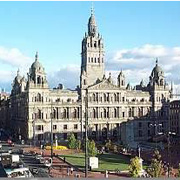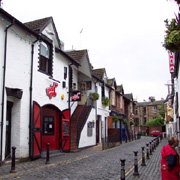英国城市--格拉斯哥
(单词翻译:单击)
Glasgow (UK)
 Glasgow's history stretches back almost two thousand years and has been rich and varied1. Originally a small salmon-fishing village at a crossing point on the River Clyde, Glasgow has been shaped by Battles, World Wide Trade and Heavy Industry to become a truly International City.
Glasgow's history stretches back almost two thousand years and has been rich and varied1. Originally a small salmon-fishing village at a crossing point on the River Clyde, Glasgow has been shaped by Battles, World Wide Trade and Heavy Industry to become a truly International City.
Founded by a Christian2 missionary3 (St Mungo), Glasgow became a major religious centre. Mungo's original church was destroyed by the wars which swept the country in the years after his death. Today's Cathedral dates from the 12th Century and has been added to in the years which followed.
Provand's Lordship, the oldest house in Glasgow was built over 500 years ago for the Lord of Provan, an official of the Cathedral. The house still welcomes visitors today to view its proud history.
In 1451 Glasgow became a University City. Glasgow University was originally built in the High Street area of the city, but was moved to its present site in Glasgow's West end in 1870.
Glasgow has also been the site of many battles. Bishop4's Castle once stood on the site now occupied by Glasgow's Royal Infirmary. Here, in 1300, William Wallace (of "Braveheart" fame) with 300 men defeated an army of 1000 English Knights5 who had taken possession of the castle under the English Bishop of Durham.
Two centuries later the castle was again the scene of battle when two opposing forces fought for control of the Crown of Scotland then in the possession of the baby, Mary Queen of Scots.
Due to its location on the west of the country, Glasgow was well positioned to send shipping6 to the West Indies and America. By the 18th century many merchants had acquired great wealth by importing sugar, rum and tobacco. Thus were born the Tobacco Lords who built fabulous7 mansions8 (大厦)in the city.
 However, life was very different for the city's poor. By the 19th century the influx9 (流入)of people looking for employment spawned10 the emergence11 of tenement12 (房屋)accommodation. The poorest families were forced to live in "single ends", one roomed homes where the entire family, often including grandparents, would live together. An example is displayed at The People's Palace. Many families had to share common lavatories13 and wash facilities.
However, life was very different for the city's poor. By the 19th century the influx9 (流入)of people looking for employment spawned10 the emergence11 of tenement12 (房屋)accommodation. The poorest families were forced to live in "single ends", one roomed homes where the entire family, often including grandparents, would live together. An example is displayed at The People's Palace. Many families had to share common lavatories13 and wash facilities.
However, the struggle for survival generated a common bond between the tenement dwellers14 and a great sense of community spirit, kindness and sharing dominated everyday life.
The existence of vast deposits of coal and iron ore (矿石)in the Glasgow area shaped the next two centuries of Glasgow's history.
With the coming of the Industrial Revolution, aided by technological15 advances designed by Clydeside inventors such as James Watt16, Heavy Industry in the shape of Railway Locomotives and Shipbuilding flourished.
Locomotives were exported throughout the world. "Clyde-Built" became synonymous (同义的)with quality and reliability17. The launch of the three "Queens" - luxury passenger liners - was the pinnacle18 (顶点)of Glasgow's shipbuilding achievement. (Many of the original shipping models are on display in the beautiful "Clyde Room" at the Transport Museum)
Sadly, the changing pattern of industry means that the Clyde no longer employs the vast throngs19 of workers in the shipbuilding trades, although there are notable exceptions. The proud "Clyde-Built" traditions are still in evidence among the workforces20 of Kvaerner Govan and Yarrows, to name but two of Clydeside's remaining shipbuilding yards.
Today the city beckons21 tourists from all over the world. Glasgow's art treasures are world renowned22 and most of the city's museums and art galleries offer free entrance to view their treasures. The city boasts a fine Concert Hall, International Conference Centre, Science Centre, Sports Arena23 and shops rivalling the best in the land.
All this combined with Glasgow's unique friendliness24 and hospitality makes the city a favourite destination for visitors from all nations.
 收听单词发音
收听单词发音
1
varied

|
|
| adj.多样的,多变化的 | |
参考例句: |
|
|
|
2
Christian

|
|
| adj.基督教徒的;n.基督教徒 | |
参考例句: |
|
|
|
3
missionary

|
|
| adj.教会的,传教(士)的;n.传教士 | |
参考例句: |
|
|
|
4
bishop

|
|
| n.主教,(国际象棋)象 | |
参考例句: |
|
|
|
5
knights

|
|
| 骑士; (中古时代的)武士( knight的名词复数 ); 骑士; 爵士; (国际象棋中)马 | |
参考例句: |
|
|
|
6
shipping

|
|
| n.船运(发货,运输,乘船) | |
参考例句: |
|
|
|
7
fabulous

|
|
| adj.极好的;极为巨大的;寓言中的,传说中的 | |
参考例句: |
|
|
|
8
mansions

|
|
| n.宅第,公馆,大厦( mansion的名词复数 ) | |
参考例句: |
|
|
|
9
influx

|
|
| n.流入,注入 | |
参考例句: |
|
|
|
10
spawned

|
|
| (鱼、蛙等)大量产(卵)( spawn的过去式和过去分词 ); 大量生产 | |
参考例句: |
|
|
|
11
emergence

|
|
| n.浮现,显现,出现,(植物)突出体 | |
参考例句: |
|
|
|
12
tenement

|
|
| n.公寓;房屋 | |
参考例句: |
|
|
|
13
lavatories

|
|
| n.厕所( lavatory的名词复数 );抽水马桶;公共厕所(或卫生间、洗手间、盥洗室);浴室水池 | |
参考例句: |
|
|
|
14
dwellers

|
|
| n.居民,居住者( dweller的名词复数 ) | |
参考例句: |
|
|
|
15
technological

|
|
| adj.技术的;工艺的 | |
参考例句: |
|
|
|
16
watt

|
|
| n.瓦,瓦特 | |
参考例句: |
|
|
|
17
reliability

|
|
| n.可靠性,确实性 | |
参考例句: |
|
|
|
18
pinnacle

|
|
| n.尖塔,尖顶,山峰;(喻)顶峰 | |
参考例句: |
|
|
|
19
throngs

|
|
| n.人群( throng的名词复数 )v.成群,挤满( throng的第三人称单数 ) | |
参考例句: |
|
|
|
20
workforces

|
|
| 全体员工( workforce的名词复数 ); (国家或行业等)劳动力; 劳动大军; 劳动人口 | |
参考例句: |
|
|
|
21
beckons

|
|
| v.(用头或手的动作)示意,召唤( beckon的第三人称单数 ) | |
参考例句: |
|
|
|
22
renowned

|
|
| adj.著名的,有名望的,声誉鹊起的 | |
参考例句: |
|
|
|
23
arena

|
|
| n.竞技场,运动场所;竞争场所,舞台 | |
参考例句: |
|
|
|
24
friendliness

|
|
| n.友谊,亲切,亲密 | |
参考例句: |
|
|
|
- 上一篇:英国城市--伯明翰
- 下一篇:阿根廷首都--布宜诺斯艾利斯




